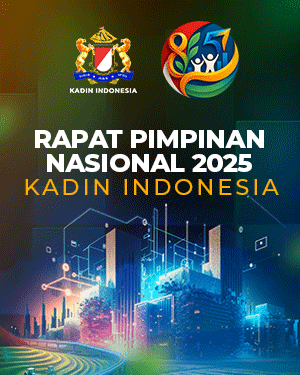
By Dr. Mulya Amri, Executive Director, Kadin Indonesia Institute
Why is the IEU‑CEPA Strategic?
The European Union is Indonesia’s second-largest trading and investment partner after China. In 2023, Indonesia’s exports to the EU amounted to approximately €13 billion. Currently, around 40% of these exports benefit from the EU's Generalised Scheme of Preferences (GSP), while the remaining 60% are subject to standard tariffs.
Through the IEU‑CEPA, zero-tariff coverage will expand to 80% of total exports, including key manufactured and processed products such as textiles, footwear, fishery products, and refined crude palm oil (CPO). In 2023, Indonesia’s top exports to the EU included CPO (US$24.8 billion), coal (US$38.8 billion), ferroalloys, and others.
With the agreement in place, Indonesian products will gain broader access to European markets, and total exports to the EU are projected to increase by up to 50% within three years of full implementation. Flagship products like palm oil, electronics, footwear, rubber, and chemicals will become more competitive and attractive to European consumers.
From an investment standpoint, the EU is a major source of capital, particularly in high-tech and infrastructure sectors. IEU‑CEPA provisions for investment protection, while preserving national policy space, provide Indonesia with a sustainable opportunity to attract quality investments. Furthermore, greater EU market access will drive domestic value-added production and generate employment.
Economic and Social Benefits
The IEU‑CEPA brings tangible benefits to Indonesia’s economy and society:
Trade and SME Inclusion: Preferential tariffs will open up the affluent EU market to Indonesian businesses, including small and medium enterprises (SMEs). This supports export diversification beyond raw CPO and promotes local downstream industries.
Investment and Technology Transfer: European investors—particularly from Germany, the Netherlands, and France—are ready to inject capital into manufacturing, green energy, and digital technology. This will spur formal job creation and skills transfer.
Job Creation: Rising exports and foreign investment will open up employment opportunities in manufacturing, agriculture, and services, especially in high-tech exports and downstream palm oil processing, benefiting skilled labor.
Cultural and Educational Exchange: The agreement also supports collaboration in education, research, and culture. More programs will become available for student, researcher, and professional exchanges—deepening mutual understanding.
IEU‑CEPA in the Global Economic Diplomacy Context
Under President Prabowo Subianto’s leadership, Indonesia has pursued an active multi-track economic diplomacy strategy—an implementation of the principle: “a thousand friends are never enough, one enemy is too many.” This approach is crucial in today’s fragmented global economy.
Indonesia has hosted and visited dozens of countries, discussing mutually beneficial economic cooperation across various sectors. Its active participation in the BRICS Summit in Rio de Janeiro demonstrates Indonesia’s commitment to global governance reform and multilateralism. At the same time, Indonesia continues to engage the United States in efforts to reduce the 32% tariff imposed by President Trump and to expand commodity trade in areas such as critical minerals and food security.
This reflects a smart economic diplomacy—avoiding dependence on any single major power while maintaining strategic access to global markets.
Progress with the U.S.
Indonesia and the U.S. are currently in the final stages of reciprocal tariff negotiations. In recent weeks, a delegation led by Coordinating Minister for Economic Affairs Airlangga Hartarto has submitted a concrete set of proposals: tariff reductions, commodity and tech purchases from the U.S., and cooperation in the critical minerals sector.
The U.S. has a clear interest in Indonesia’s nickel, copper, and cobalt—materials vital for electric vehicle and high-tech manufacturing. If concluded before August 1, this agreement could reverse the 32% tariff, boost exports to the U.S., and attract new investments.
Challenges and Hopes
While the IEU‑CEPA will open up export opportunities, it will also increase imports from Europe, particularly high-tech goods such as industrial machinery, medical equipment, electric vehicles, and pharmaceutical raw materials. This is a positive development, as it will accelerate industrial modernization, support downstream development, and improve public services—especially in healthcare and education.
However, liberalizing the domestic market also carries risks. Local products, especially those from SMEs, could struggle to compete without improvements in quality, pricing, and efficiency. To address this, the government and business sector must strengthen SME support, provide access to technology and financing, and capitalize on EU partners’ know-how as part of a broader capability transfer strategy.
Conclusion: A Transformational Moment
The soon-to-be-ratified IEU‑CEPA is more than a trade agreement—it is a strategic effort to position Indonesia as an inclusive manufacturing hub and a center for global economic diplomacy. It will unlock the EU market, attract high-quality investments, generate jobs, and expand Indonesia’s global economic footprint.
Throughout the IEU‑CEPA negotiation process, Kadin Indonesia—under the leadership of Chairman Anindya N. Bakrie—played a strategic role as a bridge between the national business community and government negotiators. Through consultation forums, policy briefs, and dialogues with European partners, Kadin has helped ensure that the agreement reflects the interests of both large industries and SMEs.
In the implementation phase, Kadin stands ready to support the government as a key partner—by raising awareness of CEPA benefits, offering technical training, and mapping the readiness of business sectors. This close collaboration will ensure IEU‑CEPA is not merely a document, but a powerful instrument for national economic growth and global competitiveness.
At a time when the world faces rising protectionism and uncertainty, the successful political agreement on IEU‑CEPA demonstrates Indonesia’s boldness and long-term vision. Coupled with ongoing progress with the U.S., Indonesia’s global reputation is rising.
The task now is clear: ratify the IEU‑CEPA, prepare businesses of all sizes to increase exports to Europe, and ensure implementation delivers real, measurable benefits for the people of Indonesia.
By Dr. Mulya Amri, Executive Director, Kadin Indonesia Institute

National Economy
Regional Economy
National Economy
Regional Economy